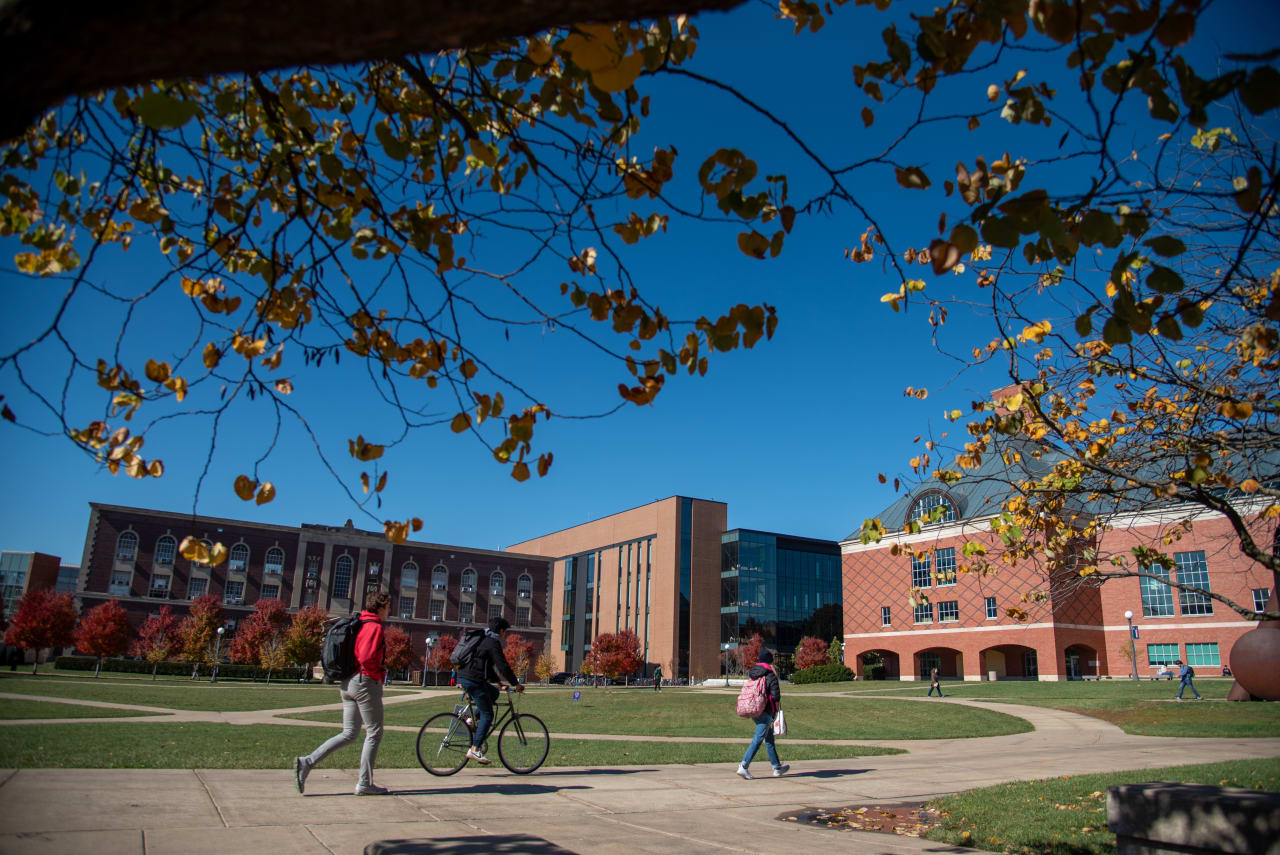
Master of Science in Agricultural and Biological Engineering
University of Illinois Urbana-Champaign – The Grainger College of Engineering

Key Information
Campus location
Urbana, USA
Languages
English
Study format
On-Campus
Duration
3 - 4 semesters
Pace
Full time
Tuition fees
Request info
Application deadline
Request info
Earliest start date
Aug 2024
* You will be able to find your program tuition by visiting the following link - https://cost.illinois.edu/
Introduction
Master of Science in Agricultural and Biological Engineering
In this program, you will solve problems in agricultural production, utilization, environmental control, and biological systems. Supporting coursework includes mathematics; computer science; statistics; engineering mechanics; chemical, civil, electrical, and mechanical engineering; animal science; crop sciences; food science; and other appropriate fields.
Our graduates are highly sought after in a competitive job market and are typically employed in industry, governmental agencies, or private consulting firms.
Admission requirements
Admission requirements include completion of an undergraduate program equivalent to the Agricultural and Biological Engineering (ABE) curriculum with at least a 3.0 grade point average (A = 4.0) for the last two years of undergraduate coursework. Applicants must submit Graduate Record Examination (GRE) scores.
All applicants whose native language is not English must submit a minimum TOEFL score of 88 (iBT), 230 (CBT), or 570 (PBT); or a minimum International English Language Testing System (IELTS) academic exam score of 6.5 overall. Applicants may be exempt from the TOEFL if certain criteria are met. For those taking the TOEFL or IELTS, full admission status is granted for scores greater than 102 (TOEFL iBT), 253 (TOEFL CBT), 610 (TOEFL PBT), or 7.0 (IELTS). Limited status is granted for lesser scores and requires enrollment in English as a Second Language (ESL) courses based on an ESL Placement Test (EPT) taken upon arrival to campus.
Program content
This M.S. program provides two options:
- Thesis Option - The thesis-based M.S. degree program is a research-oriented program of study that is usually completed in two years. Students complete at least 24 hours of coursework and 8 hours of thesis research. 18 to 24 months beyond the B.S. degree are required.
- Non-thesis Option - This non-thesis option requires 36 hours of coursework and documentation of a significant research experience with a significant writing experience.
Areas of Study
Choose from the research areas below to focus your studies:
Agricultural Safety
Research involves model programs for the collection of data related to farm injuries and illnesses, redesign of on-farm structures and management procedures to reduce the risk of airborne contaminants to worker injuries, development of sensors on off-road vehicles for human detection and safety, utilization of behavioral psychology models in the prediction and analysis of agricultural safety behaviors and providing assistance to farmers with physical disabilities. Research is being conducted to develop a human presence detection system as part of intelligent safety protection systems for off-road equipment.
Bioenvironmental Engineering
Research involves environmental control for biological systems, indoor air quality, control of airborne contaminant emissions, environmental protection, animal response to the environment, light frame structural design, and energy from biomass. A few specific projects include improving agricultural ventilation performance, reducing dust and odor emissions from livestock facilities, measuring airborne particulate distribution, providing good environments for laboratory animals, and converting swine manure into oil.
Food and Bioprocess Engineering
Research involves bioprocess modifications to develop new food coproducts with high nutritive or pharmaceutical value, to reduce food processing plant waste streams, and to evaluate improved starch characteristics of milled grains. State-of-the-art separation technologies, such as microfiltration, are being applied to conventional corn processes to give better products while gaining improved process efficiencies.
Grain Quality and Properties
Research involves developing improved corn wet and dry milling processes, dry-grind ethanol processes which remove the germ first (Quick Germ), determination of starch viscosity with rapid visco analyzer (RVA), drying effects on quality of grains, detection of extractable starch using near-infrared spectroscopy, measurement of fermentable starch, distiller’s dried grains (DDGS), and fatty acids, amino acids, and isoflavones in soybeans using FT-NIR and other physiochemical quality tests for grains and oilseeds.
Off-Road Equipment Engineering
Research involves advanced technology development for off-road vehicles, modeling of in-field crop handling systems, and evaluation of biofuels for diesel-powered vehicles.
Precision Agriculture
Research involves the development of sensors, information mapping systems, and control systems for more precise management of in-field crop planting and chemical application. Remote sensing is a major feature in the recording and processing of data from satellites, planes, and ground-based vehicles leading to both map-based and real-time control of crop planting and chemical application.
Soil and Water Resources Engineering
Research involves the management of our soil and water resources, which includes watershed hydrology, subsurface drainage, runoff, and stormwater management.
Engineering Technology and Management for Agricultural Systems
Combining knowledge of science, systems management, and applications engineering, the ETMAS program provides excellent preparation for careers in the production, processing, and manufacturing of food, fiber, feed, fuel, and construction management. Students focus on the application of engineering principles, the study of technology used in agriculture, and the integration of business concepts in the food and agricultural industries. ETMAS also has a Professional Science Master's option.
Water Quality
Research involves the processes related to water contaminant transport, the effects of those contaminants on water use, processes causing contamination, and the correction and avoidance of contamination of water. Contaminants of interest include sediment, nutrients, pathogens, and chemicals.
Scholarships & funding
Several scholarship options are available. Please check the institute website for more information.
Qualification
Student learning outcomes are based on educational outcomes suggested by the Accreditation Board for Engineering and Technology (ABET) and the objectives of the program:
- An ability to apply knowledge of mathematics, science, and engineering;
- An ability to design and conduct experiments, as well as to analyze and interpret data;
- An ability to design a system, component, or process to meet desired needs within realistic constraints such as economic, environmental, social, political, ethical, health and safety, manufacturability, and sustainability;
- An ability to function in multidisciplinary teams;
- An ability to identify, formulate, and solve engineering problems;
- An understanding of professional and ethical responsibility;
- An ability to communicate effectively;
- The broad education necessary to understand the impact of engineering solutions in a global, economic, environmental, and societal context;
- A recognition of the need for and an ability to engage in life-long learning;
- A knowledge of contemporary issues;
- An ability to use the techniques, skills, and modern engineering tools necessary for engineering practice;
- Conduct independent research with expertise in research design, methods, and analysis;
- Function effectively in leadership roles in their professional careers and activities in professional societies.
Program Language Requirements
The TOEFL iBT® test is accepted by 11,500 universities and higher education institutions in over 160 countries. Book your test today!
Sponsored partner